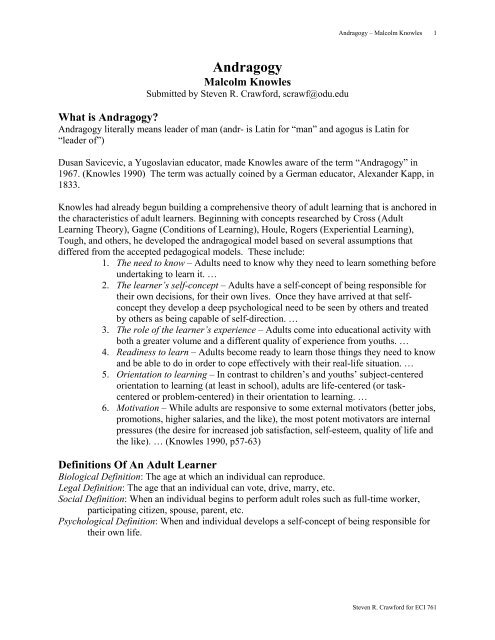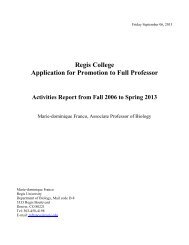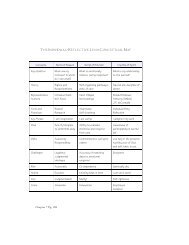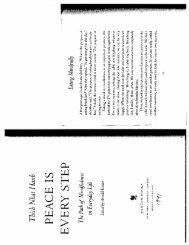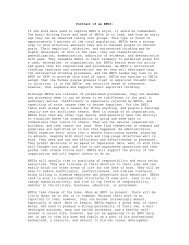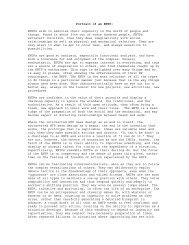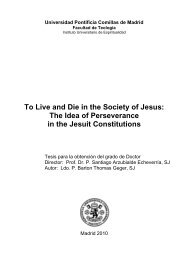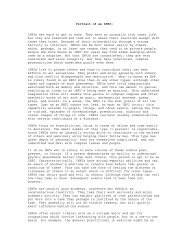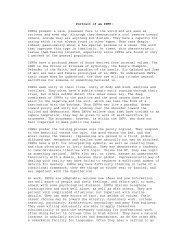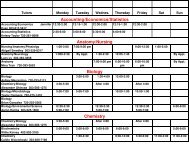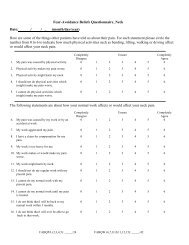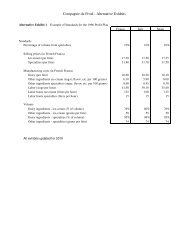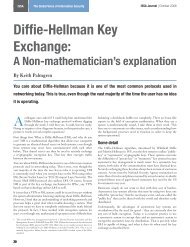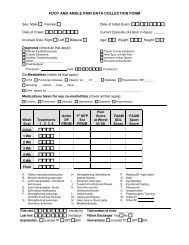Andragogy - Regis
Andragogy - Regis
Andragogy - Regis
Create successful ePaper yourself
Turn your PDF publications into a flip-book with our unique Google optimized e-Paper software.
<strong>Andragogy</strong><br />
Malcolm Knowles<br />
Submitted by Steven R. Crawford, scrawf@odu.edu<br />
<strong>Andragogy</strong> – Malcolm Knowles 1<br />
What is <strong>Andragogy</strong>?<br />
<strong>Andragogy</strong> literally means leader of man (andr- is Latin for “man” and agogus is Latin for<br />
“leader of”)<br />
Dusan Savicevic, a Yugoslavian educator, made Knowles aware of the term “<strong>Andragogy</strong>” in<br />
1967. (Knowles 1990) The term was actually coined by a German educator, Alexander Kapp, in<br />
1833.<br />
Knowles had already begun building a comprehensive theory of adult learning that is anchored in<br />
the characteristics of adult learners. Beginning with concepts researched by Cross (Adult<br />
Learning Theory), Gagne (Conditions of Learning), Houle, Rogers (Experiential Learning),<br />
Tough, and others, he developed the andragogical model based on several assumptions that<br />
differed from the accepted pedagogical models. These include:<br />
1. The need to know – Adults need to know why they need to learn something before<br />
undertaking to learn it. …<br />
2. The learner’s self-concept – Adults have a self-concept of being responsible for<br />
their own decisions, for their own lives. Once they have arrived at that selfconcept<br />
they develop a deep psychological need to be seen by others and treated<br />
by others as being capable of self-direction. …<br />
3. The role of the learner’s experience – Adults come into educational activity with<br />
both a greater volume and a different quality of experience from youths. …<br />
4. Readiness to learn – Adults become ready to learn those things they need to know<br />
and be able to do in order to cope effectively with their real-life situation. …<br />
5. Orientation to learning – In contrast to children’s and youths’ subject-centered<br />
orientation to learning (at least in school), adults are life-centered (or taskcentered<br />
or problem-centered) in their orientation to learning. …<br />
6. Motivation – While adults are responsive to some external motivators (better jobs,<br />
promotions, higher salaries, and the like), the most potent motivators are internal<br />
pressures (the desire for increased job satisfaction, self-esteem, quality of life and<br />
the like). … (Knowles 1990, p57-63)<br />
Definitions Of An Adult Learner<br />
Biological Definition: The age at which an individual can reproduce.<br />
Legal Definition: The age that an individual can vote, drive, marry, etc.<br />
Social Definition: When an individual begins to perform adult roles such as full-time worker,<br />
participating citizen, spouse, parent, etc.<br />
Psychological Definition: When and individual develops a self-concept of being responsible for<br />
their own life.<br />
Steven R. Crawford for ECI 761
<strong>Andragogy</strong> – Malcolm Knowles 2<br />
Analysis of <strong>Andragogy</strong><br />
When applying andragogy to learning, the task or goal of the learner will determine if direct or<br />
indirect methods of instruction should be used. If a concept is one that is previously unknown to<br />
the learner, then more direct instruction will be necessary. An effective method is to address<br />
specific topics of immediate concern and then expand to how it can be applied in other<br />
situations. However, the learner needs to know why the concept to be learned is important in<br />
order for the learner to remain motivated.<br />
Despite the learner ultimately having control of learning through self-directed means, the<br />
instructor and instructional designer needs to facilitate the opportunities for the learner to<br />
experience growth. <strong>Andragogy</strong> reorients adult educators from educating people to helping them<br />
learn. The methods used may range from isolated instruction within a curriculum or integrated<br />
instruction. It may also encompass intentional and unintentional learning situations. As an<br />
example, when designing materials to facilitate learning a computer program, providing a list of<br />
commands that must be memorized is inadequate. The instructions need to be organized by task<br />
and presented in a manner similar to how it will be used.<br />
There is a significant amount of flexibility provided in regards to the development of<br />
interpersonal and intrapersonal dimensions. However, the learner must be within an<br />
environment that values self-directed learning. Knowles places an emphasis on the concept of<br />
the safe environment. In particular with workplace training and development, McGregor’s<br />
Theory X & Theory Y Management Philosophy comes into play. If an organization is based in<br />
Theory X and they attempt to utilize training & development based on the principles found in<br />
Roger’s Experiential Learning, then there will be resistance to the training that could prevent its<br />
success.<br />
Knowles envisioned that learning was lifelong. A particular skill might be taught once; however,<br />
within a supportive environment, the learner might learn new approaches or methodologies from<br />
their fellow learners over time. Even though there is a lot of emphasis on the self-directed<br />
learner, this person cannot exist in a vacuum. They need to be surrounded by other self-directed<br />
learners and grouped in a manner that they can learn new perspectives from learners with<br />
different, but applicable experiences.<br />
When To Use <strong>Andragogy</strong><br />
Andragogical methods are best when they can be applied are in community situation and<br />
industry/corporate situations that are supportive of a self-directed learner.<br />
Community centers are a prime example of this (YMCA, etc.), adult learners who desire to learn<br />
new skills ranging from pottery to CPR, golf to ham radio, or home and car repairs can do so in a<br />
non-threatening environment. It is not expected that the learner will develop an expert level of<br />
knowledge of these skills, but a level that meets their immediate needs.<br />
Human Resource departments should also consider andragogical principals when designing their<br />
employee development programs, providing the organization whose management style is one<br />
that is represented by McGregor’s Theory Y. By placing a value on training and development,<br />
employees will be motivated to learn new skills to help them in their career development.<br />
Steven R. Crawford for ECI 761
<strong>Andragogy</strong> – Malcolm Knowles 3<br />
<strong>Andragogy</strong> may not be appropriate for higher education, as it is not intended for the development<br />
of a foundation of theories and practice that are critical in the higher education environment, but<br />
not necessarily used by the learner in the near-term. However, some of its implications should<br />
be considered for short-term practice. In particular using case studies and group discussions<br />
among the learners so that they can share their perspectives and life experiences with their fellow<br />
learners.<br />
Steven R. Crawford for ECI 761
<strong>Andragogy</strong> – Malcolm Knowles 4<br />
Selected References<br />
Books<br />
Knowles, M. (1990) The adult learner. A neglected species, 4 th Edition. Houston: Gulf<br />
Publishing.<br />
Internet<br />
Atherton, J. (2003). Knowles' <strong>Andragogy</strong>. Retrieved February 18, 2004 from<br />
http://www.dmu.ac.uk/~jamesa/learning/knowlesa.htm<br />
Carlson, R. (1989). Malcolm Knowles. Retrieved February 18, 2004 from<br />
http://www.nl.edu/ace/Resources/Knowles.html<br />
Hase, S. & Kenyon, K. (2000). From <strong>Andragogy</strong> to Heutagogy. Retrieved February 26, 2004<br />
from http://ultibase.rmit.edu.au/Articles/dec00/hase2.htm<br />
Kearsley, G. (2003). <strong>Andragogy</strong> (M. Knowles). Retrieved January 16, 2004 from<br />
http://tip.psychology.org/knowles.html<br />
New Horizons for Learning. (2002). Lifelong Learning: A Dream: Malcolm Knowles. Retrieved<br />
February 26, 2004 from<br />
http://www.newhorizons.org/future/Creating_the_Future/crfut_knowles.html<br />
Reischmann, J. (2000) <strong>Andragogy</strong> Homepage for Adult Education Specialists. Retrieved<br />
February 26, 2004 from http://www.uni-bamberg.de/ppp/andragogik/andragogy/<br />
Schugurensky, D. (2002). History of Education: Selected Moments. Retrieved February 26,<br />
2004, from<br />
http://fcis.oise.utoronto.ca/~daniel_schugurensky/assignment1/1970knowles.html<br />
Smith, M. (2002). <strong>Andragogy</strong> @ the informal education homepage. Retrieved February 26, 2004<br />
from http://www.infed.org/lifelonglearning/b-andra.htm<br />
Smith, M. (2002). Malcolm Knowles, informal adult education, self-direction and andragogy.<br />
Retrieved February 18, 2004, from http://www.infed.org/thinkers/et-knowl.htm<br />
Other Suggested Books<br />
Knowles, M. (1980). The modern practice of adult education, revised and updated. Englewood<br />
Cliffs: Prentice Hall Regents.<br />
Knowles, M. et al (1984) <strong>Andragogy</strong> in action. Applying modern principles of adult education.<br />
San Francisco: Jossey-Bass.<br />
Knowles, M. (1989). The making of an adult educator: a autobiographical journey. San<br />
Francisco: Jossey-Bass.<br />
Steven R. Crawford for ECI 761


